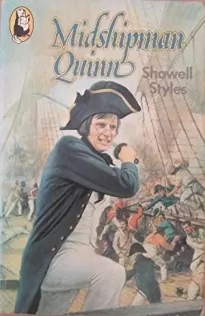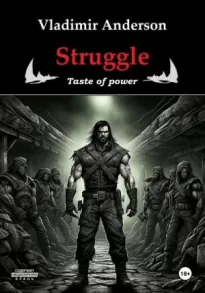Midshipman Quinn

- Автор: Showell Styles
- Жанр: Исторические приключения / Морские приключения
- Дата выхода: 1956
Читать книгу "Midshipman Quinn"
— 1 —
LIEUTENANT-DE-VAISSEAU Charles Brunel writhed and twisted on his bunk, trying to rid himself of the constricting bonds that tied his hands and feet. It was his own bunk, in his own cabin in the French sloop-of-war Chasseur. That was the most galling thing of all. To be a prisoner on board his own ship, and because of his own carelessness, was a thing that made him hot with shame whenever he thought of it — and he had thought of it continuously during the twelve hours the sloop had been at sea. For she was at sea, manned by the impudent Englishmen who had captured her and taken her out of Marseilles harbour on the previous evening.
In the side of Brunel's bunk there was a projecting nail-head. It was very difficult to get the cord that bound his wrists against that tiny rim of sharp metal and he could only do it for a few minutes at a time, but he kept doggedly rubbing the cord against it. So far there was no sign that he was fraying the cord.
He paused for a while to ease his aching muscles. What a fool, a criminally careless fool, he had been! How the Englishmen had escaped from their prison and obtained the fantastic disguises in which they had come aboard, Brunel could not guess. The fact remained that he, Charles Brunel, had himself invited them on board, without orders from his absent captain and without troubling to make certain they were what they appeared to be. As he lay helpless in his bunk, with the sloop pitching rhythmically over the waves of the Mediterranean, he was both furious and ashamed.
He was also doggedly resolved to make amends for his folly-if ever he could get free.
He was about to begin again on his attempt to fray his bonds when the door of the cabin opened and a smallish young man — a mere boy, in fact — came in. Lieutenant Brunel, after a moment's staring, recognised the leader of the English seamen.
"Good morning, Lieutenant," said the newcomer in slow but understandable French. "I trust you are not too uncomfortable?"
Midshipman Septimus Quinn had removed the moustache and small beard which had disguised him as the Great Enrico, but was still wearing the black satin coat and knee-breeches. He was also wearing his spectacles, for he had just come from the captain's cabin where he had been working out the sloop's course for Toulon. As the French Lieutenant made no reply to his greeting, he sat down on the side of the bunk and looked sympathetically at his captured foe over the steel rims of his glasses.
"Permit me once again to point out, Monsieur Brunel," he said, "that if you would give me your parole — your word of honour to attempt no escape or other action against us — I could release you from those unpleasant bonds and you could walk about on deck instead of being cooped up here."
"I will not give my parole," BruneI said sullenly.
"The other officer, Monsieur Cartier, has given his parole," Septimus pointed out. "It would be greatly to your advantage, Lieutenant, if you also would—"
"I refuse!" broke in the other loudly.
The midshipman started to shrug his shoulders and checked himself quickly. This talking in French lingo made one use French gestures. He must guard against becoming too much like a Frog!
"Then you must remain as you are," he said. "Food will be brought to you and your hands untied so that you can eat it. Otherwise, you have only yourself to thank for your position."
"Do I not know it?" Brunel broke out passionately. "Was it not I myself who asked you and your cursed Troupe on board? Your Strong Man and your acrobats—"
"Not forgetting the charming ladies," put in Mr. Quinn with a chuckle. "But I think I understand you, Lieutenant," he added more seriously. "You blame yourself and will take the consequences. Also, perhaps, you are hoping that we shall encounter the sixty-gun French warship Vengeur."
Charles Brunel gave a start, and Septimus, who was watching him, noticed it.
"Yes, Monsieur Brunel," he nodded. "Sous-Officier Cartier has informed me that the Vengeur sailed from Marseilles thirty-six hours ago in search of His Majesty's frigate Althea, my own ship. So far nothing has been seen of her, and it's quite probable that the frigate has already reached Lord Nelson's fleet off Toulon. When this vessel also reaches the Toulon fleet, you will be honourably treated as a prisoner of war. I repeat, Monsieur, you have nothing to gain by refusing your parole."
"Yet I still refuse it," growled BruneI.
Septimus took off his spectacles, wiped them, and put them in his pocket.
"Bien, Lieutenant BruneI," he said, "I shall not ask you for it again. You may like to know that it is now two bells in the forenoon watch with a fair breeze blowing from due west, and that I hope to be with Lord Nelson's fleet by nightfall." He stood up. "It is warm in here — I'll send a glass of wine down to you."
"I want no wine — you understand? No wine!"
Brunel spoke savagely, and writhed over until his face was turned to the cabin bulkhead. Septimus, after a moment's hesitation, bade him au revoir and went out of the cabin.
Left alone once more, Charles Brunel recommenced rubbing his bonds against the protruding nail-head. He had not been unmindful of his enemy's courtesy in offering him wine, but he had refused it because it meant that his hands might be untied. Whoever untied them might notice the fraying of the cord which he hoped had begun. If he could but free his hands it would be easy to free his ankles. And then? The sloop's powder-magazine was below decks amidships, and locked. He could not hope to break into it unobserved. But he might reach the store where the cotton-waste and oily rags were kept, and there was flint-and-steel there too. He could start a fire that a meagre crew of six English seamen would not readily put out, and that fire would eventually reach the magazine. There would be an end of Charles Brunel as well as of the Englishmen, but Brunel cared nothing for that. He was in the mood to give his life to wipe out the shame of his capture.
It was two bells in the forenoon watch, that spectacled youth had told him. At noon his food would be brought to him. They would untie his hands then and see the frayed cord. If he was to get free, he had only three hours — or less — to manage it. He set to work with furious energy, rubbing and rubbing at the fraying of the cord.
Midshipman Quinn made his way slowly on deck. He was inclined to like Lieutenant Brunel, and felt a certain sympathy for the Frenchman. However, if the young man chose to be sullen and discourteous he could do nothing about it. He came up into the sunshine of a bright and windy September morning, and his spirits rose as he remembered what he had achieved. Not only had he brought all his six men safely out of the clutches of the enemy — out of a French prison and a great French port — but he had also taken a valuable prize. If he could bring the Chasseur into the safety of the Toulon fleet he would have done a notable piece of work which would probably be reported in the Gazette and advance his chances of early promotion. And unless the sloop fell in with the Vengeur there was every reason that this would happen.
The sloop was bowling merrily along under full sail. Beamish had been right when he judged her a fast sailer. On every side stretched the brilliant blue, flecked with white, of the Mediterranean, for Mr. Quinn was keeping the French coast below the horizon on his larboard hand. Fortunately a sloop-rigged vessel, with a single mast, a jib, mainsail, forestaysail and gafftopsail, was not difficult to handle with a skeleton crew. But it took all six of his crew to put her about or shorten sail. Just now she was running free, and the trustworthy Frith at the helm needed no assistance. But every man, he noticed with pleasure, was on deck and busy.
O'Neill's red head could be discerned high above the deck where he was perched on the truck of the mast as lookout. Wallace and Eccles, their paint and feminine draperies removed, were squatting under the weather bulwarks constructing the British colours out of some strips of signal bunting — neither they nor Midshipman Quinn would feel happy until those colours could be hoisted on their prize. Dobbs and Beamish were bending over one of the six twelve-pounder guns the sloop carried, getting to know the slight differences between its elevating system and the system used on British sea cannon. Dobbs had been a gunlayer on board the Althea, and had already spent some hours that morning training his shipmates in running-out and laying the French guns. Like O'Neill and Frith, Seaman Dobbs still wore the motley costume of tights and ribbons in which he had made his escape. And as for the gigantic Beamish, he was still wearing the leopard-skin of the Strong Man. Only two of his men, reflected Septimus, looked like British seamen. He doubted whether so fantastic a crew had ever appeared on the deck of a warship, French or English.
After exchanging a word with Frith at the helm, the midshipman was about to walk for'ard and talk to Beamish when Sous-Officier Cartier, French prisoner on parole, crossed the deck to intercept him.
"A friendly wind for you, Monsieur Quinn," he said with his ingratiating smile. "I wish you good fortune in rejoining your own ship at an early date."
"For the moment, Monsieur Cartier," retorted Septimus, "this is my ship."
He passed on, leaving Cartier to return with a shrug to his lounging-place by the lee-rail. Septimus did not like Cartier, who showed himself too eager to make friends with his captors. He much preferred the sullen Brunel. Though Cartier had given his parole, and had readily answered all the questions put to him, the midshipman did not trust the man and had given orders to Dobbs to keep an unobtrusive eye on his movements.
Tod Beamish straightened himself and knuckled his forehead as Midshipman Quinn approached.
"Guns all ready, Mr. Beamish?"
"Ready and trim, sir," replied the big seaman, grinning as Septimus used the "Mister" that indicated that Beamish was second-in-command — temporarily — of a warship. "Me and Dobbs, we've got these here trunnions sorted out now. We'll not be able to fire a broadside of more 'n two guns, though, sir — not with a crew of six all told."
"But the Chasseur can show a clean pair of heels to anything near her size," nodded Septimus thoughtfully. "Can she outpace the Vengeur, do you think?"
Beamish shook his thatch of tow-coloured hair. "I doubt it, sir. That Monseer Cartier, he says Vengeur's very fast for a ship-rigged vessel. "
"Then we'll fight for it if we meet her." Mr. Quinn looked his second-in-command in the eye. "We've no chance, of course — but I don't want to see the inside of a French prison again."
"And so say all of us, sir," responded the big seaman heartily. "Once we've got them colours hoisted, we don't strike 'em, not if twenty Vengeurs lay us board-and-board!"
Septimus chuckled. "That sounds as Irish as O'Neill," he remarked. "But I'm glad you feel like that. Have you looked through the sloop's armoury?"
"I have, sir — and I've took the liberty of having a dozen pistols ready loaded. The twelve-pounder balls is laid ready in the nettings aside of each gun, there's powder ready to bring on deck, and I've got water-buckets charged and standing by, sir."
"Very good, Mr. Beamish. You locked the powder-magazine, I trust?"
"Yessir. Here's the keys."
Beamish handed them over and Septimus dropped them into his pocket.
"So far as I can find out, these are the only set," he said in a low voice. "All the same, you'll keep an eye lifting for any treachery on the part of the French gentleman, Mr. Beamish."
"Aye aye, sir — but I reckon the Monseer's too fond of his life to try and blow us all up."
"None the less, you'll watch him, Mr. Beamish. And if we sight a strange sail he must be taken below and locked in his cabin. Did you find any swords or cutlasses?"
"Cutlasses, sir — a round score of 'em," answered the seaman. "In the rack at the bottom of the companionway. They're a various lot, as you might say — all sizes and some of ' em not too sharp."
"Choose six of the sharpest," ordered the midshipman, "and issue one to every man. He's to keep it handy or in his belt. If we go into action I want every man at his station at once, without having to go looking for weapons. And, Mr. Beamish, pray choose a light one for me. My wrists aren't steel engines like yours."
"Aye aye, sir!" grinned Beamish, and hurried below to obey. Septimus went aft again, and Seaman Eccles came trotting up to him.
"Colours ready for 'oistin', sir!" he reported. " 'Tain't much of a job, but it's the best we can do."
"So long as they don't look like the Tricolour they'll do," nodded Mr. Quinn. "Have them bent on to the halliards."
As soon as Beamish returned to the deck the five men of the sloop's crew (Frith being at the helm) formed rank and stood to attention while the makeshift British flag was hoisted to the peak of the Chasseur's mainyard. Then the colours were lowered again and the Tricolour bent on ready for hoisting. It might yet be necessary to sail under false colours in order to have a chance of evading recapture.
The sloop swooped onward over the blue like a seabird, her forefoot slicing into the curling seas as she headed ever eastward towards the station of Nelson's blockading fleet. Septimus took a short spell at the helm, relieving Frith so that the seaman could arm himself. He had learned the rudiments of handling a sailing-boat during the few days the Althea had spent at Gibraltar, but he grasped the big tiller of this large vessel with some nervousness. Under full sail, however, the Chasseur was so perfectly trimmed that she answered to the slightest pressure on the helm, and for a few moments he experienced the real delight of being in full control of a sailing-ship. In a later year, when circumstances placed him in command of a British sloop and "Quinn of the Fury" made himself famous, he was to experience this elation again. On this occasion it was not to last long.
Down in the gloom of a cabin beneath Midshipman Quinn's feet, Lieutenant-de-Vaisseau Brunel was sitting up in his bunk and massaging the wrists of his freed hands. His labours had been rewarded. The cord had parted at last. A light of fanatical determination gleamed in his dark eyes as he leaned forward to wrestle with the cords that bound his feet.





